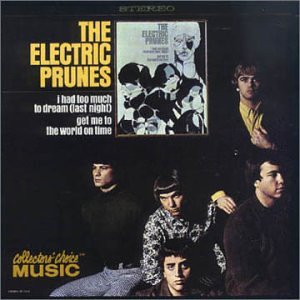
- Format: MP3

I Had Too Much to Dream (Last Night) was, for many years, one of the more easily obtainable pieces of original '60s psychedelic punk — propelled by the number 11 chart placement of the title song and the distribution of Warner Bros. Records, I Had Too Much to Dream (Last Night) actually sold in some quantity, and in the 1970s and 1980s it was possible to find it at garage sales only a little less frequently than, say, Jefferson Airplane Takes Off and a third-as-often as the Grateful Dead's first three LPs. As a result, it may well have started any number of unsuspecting '60s music listeners and yard-sale habitues on the road into this fuzz-toned, acid-laced realm of garage punk, and understandably so, because despite some flaws, it was a strong beginning, presenting both the band's pop-psychedelia and garage punk sides. Indeed, the original album's first side is about as good as records like this ever got from major labels — the opening title tune is an amazingly compelling and urgent psych punk explosion, intermingled with a psychedelic/linguistic conceit in its title and lyric that made it linger intellectually as well as aesthetically. The rest was a strong but sometimes oddly uneven mix of garage punk, lightweight pop-psychedelia, blues, and offbeat nostalgia, most of it good and none of it offensive, but some of it distracting from the most innovative and fierce sounds surrounding it. "Bangles" kept the title track mood intact, with some vibrato-laden guitar and some shifts to waltz tempo that worked even if they didn't accomplish much — think of a song that coupled the prime elements of Bill Wyman's "In Another Land" and George Harrison's "I Me Mine" (neither of which had yet been recorded). "Onie" was an unexpectedly soft teen pop ballad steeped in lyricism and paralleling the mood of Michael Nesmith's "Don't Call on Me" (off of the Monkees' Pisces, Aquarius, Capricorn & Jones Ltd.) and (very slightly) the wistful tone of the Velvet Underground's "There She Goes Again." "Are You Lovin' Me More (But Enjoying It Less)" is the lost garage punk classic here, complete with a Farfisa organ break and short, dramatic silences reminiscent of such Brian Wilson productions as "The Little Girl I Once Knew," with reverb-soaked percussion. The band composition "Train to Tomorrow" starts off as classic garage punk with a psychedelic edge, carrying a great beat and pleasing hooks in its first half — the second half is more in the realm of jazz psychedelia, the lead guitar playing a more low-key version of the sounds generated by Roger McGuinn on the break from "Eight Miles High." And "Sold to the Highest Bidder" was a bizarre, quick-tempo Arabesque highlighted by an electric mandolin, shimmering electric guitar in the background, and an incessant tambourine. Side two opened very well with "Get Me to the World on Time," the number 27 charting follow-up, which had a Bo Diddley beat and guitar and feedback timbres thoroughly in the mold of the Rolling Stones, somewhere midway between "Get Off of My Cloud," "Have You Seen Your Mother, Baby, Standing in the Shadow," and "Please Go Home" — all of which were engineered by Prunes producer Dave Hassinger. But then the band digresses into the 1930s Harry Warren/Al Dubin number "About a Quarter to Nine," which it does well enough in an archaic cocktail lounge style. "The King Is in the Counting House" is a piece of silly Baroque pop with a closely recorded string ensemble and harpsichord that adds nothing special to the record, though at the time it must've seemed like a pleasantly spaced-out number. Much better is the bluesy Jim Lowe/Mark Tulin original "Luvin'" and the snarling, Paul Revere & the Raiders-style "Try Me on for Size," the latter even offering a marimba-dominated break and final verse (including a lyrical allusion to "Satisfaction") that sounds like it was saved from the Rolling Stones' Aftermath sessions. "Toonerville Trolley" was another one of those zany digressions that used to end up on pop-psychedelic albums, this time done in a 1920s vaudeville band style — it isn't that bad, and might've fit beautifully on an early Nitty Gritty Dirt Band album, but it has nothing to do with the rest of this record or the Electric Prunes' actual sound. The Collectors Choice reissue is significantly enhanced by the presence of two bonus tracks, consisting of both sides of their debut single, the pounding, sneering "Ain't It Hard," with its guitar and harmonic flourishes, and the Lowe-authored "Little Olive," a piece of Arabesque-laden garage punk.